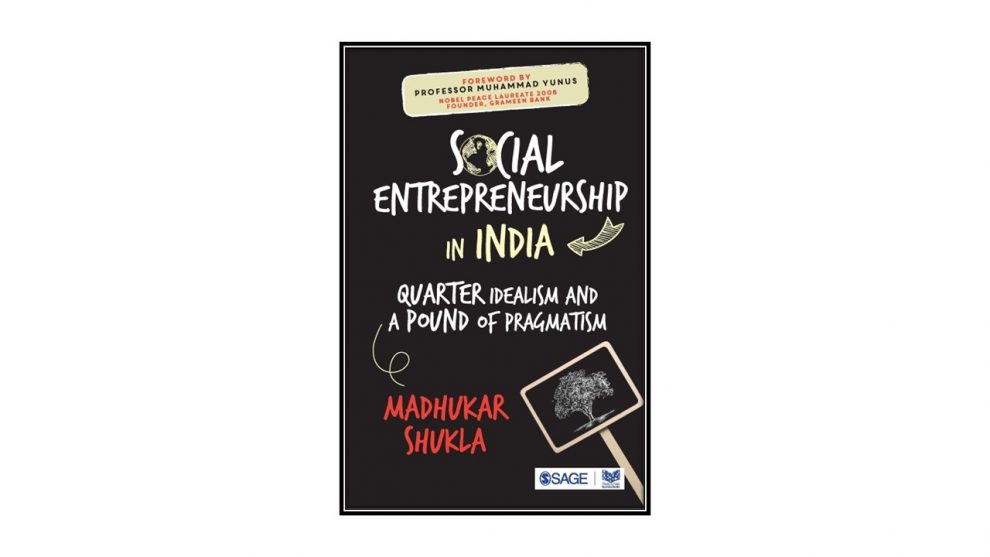Madhukar Shukla (2023)
New Delhi: Atlantic Press
284 pages
ISBN:9789353882372
Online ISBN:9789353885892
Price: INR 489
A book by an Indian academic on social entrepreneurship was long overdue. The nascent twenty-first century field of social entrepreneurship has expanded significantly since, among other reasons, Muhammad Yunus winning the Nobel Peace Prize in 2006. He won for his work on microfinance, interest among business schools in emerging markets and business models beyond state and market failure, the increasing flow of global capital for exploring social enterprises, and entrepreneurship as a solution to the problems faced by the poor. This is despite ‘social entrepreneurship’ having had a longer history and the word being popularised by Bill Drayton and his organisation ‘Ashoka’ that has been supporting social entrepreneurs across the world since 1980. There are 599 Ashoka Fellows from India from the over 3300 Fellows, reiterating the need for an Indian perspective despite the rise of specialised journals on social innovation and entrepreneurship internationally.
‘Social entrepreneurship’ means different things to multiple audiences. Increasingly, it is identified more closely with impact investing and social enterprise despite many of the celebrated pioneers having always had a much broader view of social change. A narrow ahistoric definition runs the danger, for instance, of misleading young students into thinking that the original inspiration for the celebrated Aravind Eye Hospital is McDonald’s, rather than Mahatma Gandhi’s ideas of Sewa and trusteeship or Aurobindo’s spirituality.
It is not often that academics are an integral part of a wider movement of social change, bearing witness, as it were, of the rise, the ebbs and flows of a movement. Shukla’s persistent interest and curiosity in the subject and sphere transformed him from being a participant-observer to an action researcher and we should thank him for being the rare academic who has chosen to share their insights through a well-researched and readable book for a wider audience. Shukla’s Social Entrepreneurship in India fills a big gap in the growing interest in the domain and is neither needlessly celebratory of individual social entrepreneurs and their remarkable stories nor overly critical of the failing of the sector to bring about lasting social change. Instead, Shukla brings distilled insights through nine well-structured chapters that are based on his interaction with over 120 Indian social entrepreneurs and a nuanced awareness of the debates on the field.
The book aptly begins with the challenges in defining the field and why an ‘umbrella’ approach is better than a ‘validity police’ given the diversity and infancy of the discipline, and the contextual entrenchment of practice. The emergence of the sector through key moments from 2000-2010 are well-traced and provide the reader with a useful primer, especially given the prevalent mix-up of all entrepreneurships with start-ups. The subsequent chapters delve into the nuances, and appropriateness of entrepreneurship in the social sector, through simple examples that illustrate its sector-agnostic nature and the key element of opportunity identification, rather than risk taking, as the key behavioural trait. In Chapter 3 the importance of entrepreneurial thinking – drawing from recent research on entrepreneurship –provides an important framework to look at the effectual logic of entrepreneurs differently from the causal logic that managers are trained for. What remains unstated is that educators and researchers in social entrepreneurship also need to be entrepreneurial and think outside of their academic boxes.
The brief chapter on social and commercial entrepreneurship highlights possible organisational models for social entrepreneurship and the legal forms that social enterprises can take in India. The need to balance idealism with grounded pragmatism is highlighted in the chapter, also validating the subtitle of the book, ‘Quarter idealism and a pound of pragmatism’. As the title suggests the balance is clearly in favour of the latter with greater emphasis on execution that avoids the woolly thinking of lofty idealism. Creating sectoral norms or standards of practice and promoting social institutions that empower the community are potential means through which organisations, such as SEWA for instance, codify what full employment and self-reliance mean.
The chapter of five archetypes of social entrepreneurs provides a useful outline to capture the diversity of social entrepreneurship in India. Shukla suggests that local changemakers, public good providers, constructive opportunists, social transformers and ecosystem builders can play important roles. He offers this not as exclusive categories, and one might suggest that an academic or educator can play some of these roles with students – as Shukla did – in creating a local social entrepreneurial ecosystem at XLRI by being a constructive opportunist and a local changemaker too. The chapter on scaling is yet another reminder of the diversity of options rather than an equity investor driven model of scaling. Social entrepreneurs can choose different models to scale their work and contribute to social change even without scaling.
It is but appropriate that chapters on markets, unequal access and entrepreneurial models for providing this come at the end. These are important frames to re-think skilling, franchising and business models that are likely to be different in the social space. Here too the range of examples and the format of the narrative stand out. The advantage of a book, such as this one, is the multiple ways in which educators can use it. Rather than relying on expensive case studies there are enough examples here that educators can draw from to encourage students to delve deeper. The book could be used as a standard textbook or as a reference book with some chapters taken up in a modular form depending on the institutional context and stage of the course offering. Importantly, for all the practitioners who have built the field this is a great read that places their work in a broader context inviting more academics to engage with the field.
The book will continue to remain a critical reference point for academics and practitioners even as social entrepreneurship as a subject in India has seen a decline in management schools and a significant rise in social work schools and universities. As the field enters a new phase – fighting for space in a bubbly start-up world and with a plethora of schemes and incubators promising newer opportunities for India’s aspirational youth – Shukla’s book is a reminder that the field is vast and deep with rich diversity and a history that cannot be ignored or wished away.
C Shambu Prasad
 Dr C Shambu Prasad is Professor, Strategic Management & Social Sciences at the Institute of Rural Management (IRMA), Anand, India, and teaches social entrepreneurship. He also founded IRMA’s incubator, ISEED. (Email: shambu@irma.ac.in)
Dr C Shambu Prasad is Professor, Strategic Management & Social Sciences at the Institute of Rural Management (IRMA), Anand, India, and teaches social entrepreneurship. He also founded IRMA’s incubator, ISEED. (Email: shambu@irma.ac.in)





Add Comment